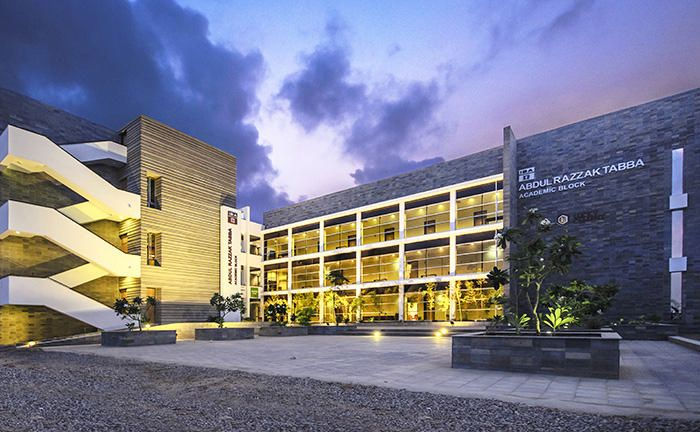From Classrooms to Boardrooms: How IBA Shaped My Journey and the Future of Banking

This article was published in IBA Today – Special Editorial Feature – August 2025 published in Southasia Download Complete PDF | Download Zafar Masud’s Article PDF Extract
IBA taught us that leadership isn’t about titles but taking responsibility for outcomes bigger than oneself.
In every individual’s life, someinstitutions don’t just educate—theyshape identity. For me, the Instituteof Business Administration (IBA) isnot just where I studied business; it’swhere I first understood purpose.
When I reflect on my years at IBA Karachi, what stands out most is not just the curriculum or the professors—formidable as they were—but the culture: one that prized discipline, merit, integrity, and public purpose. These were not abstract principles for us. They were living values that defined how we showed up, not just in exams, but in life. IBA taught us that leadership isn’t about titles but taking responsibility for outcomes bigger than oneself. Years later, when I took the helm at Barclays Southern Africa, National Savings, and The Bank of Punjab (BOP), I returned to these same values—not nostalgically,but as tools for institution-building.
When I joined BOP, it was a bank in transition. What it needed most wasn’t just better balance sheets or digital upgrades—it needed a revival of trust, culture, and vision. In other words, it required reform with soul. And for that, my IBA training became my North Star. I often say that BOP today is not just a bank but a platform for inclusive development.
In many ways, it mirrors the spirit of what IBA has long stood for: an institution that uplifts, innovates,and leads by example. Under our new strategy, BOP is pioneering programs that address fundamental issues in Pakistan—access to finance for farmers through the Kissan Card, inclusive lending through the Asaan Karobar Card, climate-responsive finance via e-bikes and rooftop solar loans, and digital transformation through our DigiBOP platform.
These are not just products. They are a response to the same question IBA taught us to ask: How can markets serve the many, not just the few?
In fact, I often tell my team at BOP that we must become the IBA of banking—an institution known not just for competence, but for character. We must blend data with dignity, innovation with empathy, and profits with public good. This is easier said than done.
IBA’s legacy is replete with stories like mine—of alumni who’ve gone on to build institutions, serve governments, and reform industries. And while we rightly celebrate these accomplishments, I think we must now ask a deeper question: What should the next generation of IBA graduates strive for?
My answer is this: Nation-building.
Pakistan is at an inflection point. We face converging crises—economic stagnation, climate vulnerability,rising inequality, and institutional decay. These are not problems that quarterly profits or consultant decks can solve. They require deep systems thinking, ethical leadership, and bold experimentation. In other words, they require IBA graduates not just to seek employment but also to create impact.
At BOP, we’re trying to create a space where this mindset can flourish. We’ve launched leadership pipelines, policy innovation labs, and public-private collaborations—not as vanity projects,but because we believe reform is contagious. When a public-sector bank can show agility, integrity, and impact,it sets off a ripple across the ecosystem.
We hope other institutions—banks, universities, government departments—will catch this energy. I am trying to replicate the same zeal in the largest listed entity of the country,Oil & Gas Development Company Limited (OGDCL), and at the very important trade body of the country,Pakistan Banks Association (PBA), where I am presently serving as the Chairman.
IBA can play a catalytic role in this transformation.
It is no longer enough for business schools to produce good analysts or brand managers. Pakistan needs entrepreneurial civil servants, socially conscious bankers, climate tech founders, and policy-literate CEOs. We need women and men who can think in systems, work across silos, and build new institutions.
IBA can—and must—lead the way by reimagining its role as a national think tank and leadership incubator.
However, to do that, IBA must also look inward. It must continue to expand access, diversify its student body, and localize its research. Our challenges are unique—we need uniquely Pakistani solutions. That means more research on Pakistan’s informal economy, more case studies on rural entrepreneurship,more courses on climate finance, public budgeting, and Islamic banking. And yes, more partnerships between IBA and institutions like BOP.
For example, I would welcome IBA students and faculty to work with us on projects like:
- Building AI-powered credit scoring models for small farmers
- Evaluating the impact of government-backed subsidy programs
- Designing green-finance frameworks that align with Pakistan’s climate commitments
- Creating financial literacy tools for women entrepreneurs
Such collaboration can create a virtuous cycle: IBA brings intellectual depth, BOP, OGDCL, and PBA bring field experience, and together we create public value. This is how meaningful development happens—not in isolation, but in integration.
Let me end with a personal reflection. I recently wrote a book called Seat 1C, which chronicles my survival of the tragic PK-8303 plane crash. That experience reshaped how I view life, leadership, and legacy. In the weeks after the crash, I received hundreds of messages—many from IBA alumni, students, and faculty. Some were simply wishing well. Others said that watching my journey made them believe in reform again. I carry that responsibility with humility. But more than anything, it reminds me that we are never really alone in our struggles. We stand on the shoulders of institutions that raised us. And we owe it to them and the country to rise.
IBA raised me. BOP, OGDCL, and PBA are the platforms I’m presently using to give back to our society and our community. Pakistan is the project we must all complete together.